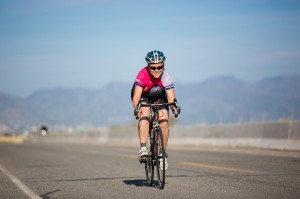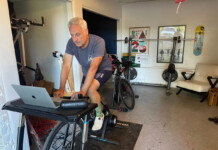
By Mark Deterline
Babes & Boomers
Dave Harward and I work with amazing athletes. Several of our clients represent a great topic for this issue’s column: some in their teens and some just over 50.
With the exciting growth of the Utah High School Cycling Association, led by director (and Dave’s wife) Lori Harward, we have been more involved with youth cycling in recent months and are now coaching some young and extremely promising riders.
At the other end of the spectrum, riders in their late forties and fifties – and beyond – come to us from a variety of backgrounds. Some raced earlier in life and want to get back into it, some are new to the sport, and still others want to take their fitness to the next level, whether to prepare for challenging rides or targeted events.
Both younger and more mature riders come to us with unique considerations. Actually, every individual athlete does. However, these two groups effectively illustrate two sides of a spectrum that represent exciting subgroups within our cycling community.
Tender Years
Young athletes are versatile and resilient, yet they can also be impressionable and sometimes even fragile. They are endearing because they represent hope and promise, and impress with their dichotomous nature; they can be at once assertive and savvy in their sports while shy and insecure as developing individuals.
They may also excel quickly given natural aptitude or good mentoring – or both. Which is why supportive parents and youth programs can make such a difference in their athletic development, as well as in the growth and health of our sport.
The key is developing them thoughtfully, with an emphasis on participation, enjoyment and carefully measured progress. There are far too many stories of young athletes with great potential who lost interest or, worse, who were “burned out” by overeager parents or coaches.
Forever Young
Human physiology changes as we age. That is an objective observation, not a judgment. One of the exciting aspects of endurance sports is how well athletes in their forties, fifties and sixties can compete, often at a very high level.
Part of coaching a mature athlete is reassuring them of their ongoing physical potential. If they were particularly active earlier in life, especially if they once excelled in their chosen sport(s), getting back to a level they feel good about can take some patience.
While respecting the needs of young bodies is a crucial part of working with young athletes, awareness of the “maintenance” needs of mature bodies is crucial. Over the years, habits and lifestyle tend to catch up with us. As an athlete grows older, even more care should be taken to foster flexibility, recovery in the form of rest and nurturing practices such as massage, and cross-training for strength as well as to preserve bone density.
At the same time, aspects of a mature athlete’s fitness may be different than they were in younger years. For example, recovery cycles – both during a workout or race as well as from workout to workout – may have lengthened. Another common characteristic of the mature athlete is a need for longer warm-ups before hard efforts.
The good news is that regardless of age, athletes can attain an amazingly high level of fitness and confidence in their sports, as well as shed pounds they had previously found elusive to lose.
Having a go
One of our athletes who has made exceptional progress over the past six months is 51 year old Debora Adam. She and I first met last fall when I led a clinic on time trialing – being in an aerodynamic position on an “aero” or “triathlon” bike.
Following the clinic, Dave and I held a training Q&A for her women’s team, and Debora became increasingly intrigued with the possibility of further development in all areas of cycling: fitness, bike handling skills, weight loss, positioning on a bike, and participation in competitive events. On December 1st, she took the step and began structured coaching with me.
Jumping ahead to today, Debora has accomplished many of her goals. She is now twelve pounds leaner, can generate significantly more power/speed on her road and new time trial bike, rides more skillfully and confidently in a group, is more comfortable on her bikes, and rides stronger longer than ever before.
In fact, as she has progressed, she has tackled a growing number of challenges in the form of participation in events that previously would have proven intimidating or seemed too daunting.
The wonderful, and perhaps most important, thing about Debora’s progress is how much fun she is having. Dave and I will see her at one of the weekly time trials, where most of the riders are very serious, focused on the imminent race of truth or relieved that it’s over. Meanwhile, Debora is beaming. She loves the challenge and the inevitable rewards that come from her investments, both athletic and monetary.
Debora carefully weighed the benefits of various training plan levels we offer, and decided to choose one that would allow me to customize it on a weekly basis as well as facilitate frequent communication. Then she came in for a power test and we proceeded to plan her coming weeks, including events she would use as training and those she would target as primary objectives for which to taper and peak.
One thing that has been particularly fun in charting Debora’s course has been her spontaneity in considering events to include as part of her season. She will text or email me several days before a weekend full of ride or race opportunities to see what fits optimally within her training plan.
Often I can give her options, such as explaining that a shorter event with climbs might serve her fitness better at a given time than a longer, flatter event. Or I can explain the benefits of each option: she could ride a shorter event harder for speed work, or a longer one at lower intensity for foundational endurance. We have made several such decisions together, each of which has yielded specific gains and built Debora’s confidence.
Getting after it
It is this kind of process that makes coaching, and being coached, immensely rewarding. So, Dave’s and my advice to you is to seek out guidance from a qualified coach or mentor and get started. You need no other reason than to want to. Any aspiring athlete who “gets after it” is one worthy of respect, admiration and praise. And you will likely feel better and badder than you ever have!
Dave Harward and Mark Deterline offer over thirty years of combined endurance training and competitive experience. Plan 7 Endurance Coaching provides professional coaching, biomechanics (bike fitting) and testing services for athletes of all levels. Reach Dave and Mark via email [email protected] or call 801-661-7988.







